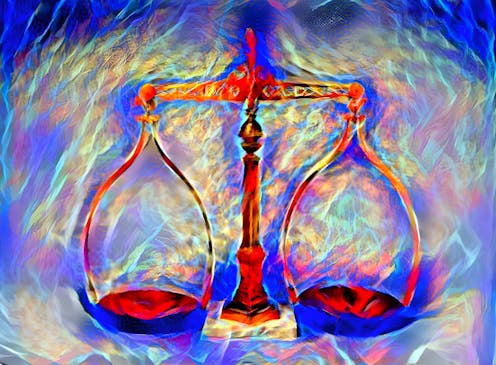
As research into psychedelics and their medical uses makes a comeback, scientists are having to deal with the legacy – both scientific and social – of a 40-year nearly total freeze on psychedelics research.
In this episode of “The Conversation Weekly” podcast, we speak with three experts about the early rise and fall of psychedelics in Western science and culture, how the mystical and often vague language of the ‘60s and '70s still pervades research today and what it’s like to actually run clinical trials using psilocybin.
According to a poll done in the summer of 2022, nearly 30% of U.S. residents have tried at least one psychedelic drug in their lifetime. Whether from personal experience, hearing about the experiences of friends or widespread depictions in the media, many people will have either tried to describe a psychedelic trip or heard someone else describe one. The language commonly used in these descriptions is, for lack of a better word, often quite trippy.
“A key function of the ego is to identify differentiation,” says Robin Carhart-Harris, a neurologist and psychologist at the University of California, San Francisco, and one of the world’s leading psychedelics researchers. “And when that function breaks down, it’s replaced with a sense of de-differentiation, a sense of unity, like everything is interconnected in a web of relationships. That’s not nothingness, it’s sort of everythingness.”
Many psychedelics researchers use an approach called “the mystical framework” to assess psychedelic experiences. Researchers who use this framework give participants in psychedelics studies a survey as a way to define and categorize the experience. The survey asks participants to rate how strongly they felt certain phenomena during their trip, including feelings like the “certainty of encounter with ultimate reality (in the sense of being able to 'know’ and ‘see’ what is really real at some point during your experience).”
But some researchers, such as Josjan Zijlmans, at Vrije Universiteit Amsterdam in the Netherlands, think the mystical framework poses some problems.
“I think the experience that people are trying to describe is very valuable, but calling it mystical is a misnomer,” Zijlmans says, “because mysticism in general is associated with many vague and supernatural concepts, which I think shouldn’t be part of this sort of scientific endeavor.”
According to Zijlmans, there is no reason researchers couldn’t come up with more precise language to define psychedelic experiences. However, this language, and psychedelics generally, have a long contentious history when it comes to associations with spiritual and counterculture ideas – as well as scientific ones.
“There was an enthusiasm for psychedelics in the ‘20s and '30s, but it never really captured a lot of attention,” explains Wayne Hall, a professor of health and behavioral sciences at the University of Queensland in Australia. “Back then, you didn’t need an ethics committee to approve research. You didn’t need a clinical trial protocol. You just tried out the drugs on your patients to see if they worked.”
Early enthusiasm and experimentation produced some far-out ideas and strong advocates, such as the Harvard psychologist Timothy Leary and others. But during the '60s and '70s, the attitude toward psychedelics changed.
“There was the fear that you might end up like Timothy Leary. If these drugs could do this to a Harvard professor, what might they do to you?” says Hall. “If you want a promising career, then you’d be wise to stay away from these drugs.” As a result of this shift – and strong government pushback against the use of psychedelics recreationally as well as medically – research almost stopped entirely from the '70s to the early 2000s.
Today, psychedelics research is undergoing a resurgence. Listen to the full episode to find out how the legacy of the '60s and '70s, though fading, is still influencing the world of psychedelics today, for better or worse.
This episode was produced by Mend Mariwany, with sound design by Eloise Stevens. The executive producer was Gemma Ware. Our theme music is by Neeta Sarl.
You can find us on Twitter @TC_Audio, on Instagram at theconversationdotcom or via email. You can also sign up to The Conversation’s free daily email here. A transcript of this episode will be available soon.
You can listen to “The Conversation Weekly” via any of the apps listed above, download it directly via our RSS feed, or find out how else to listen here.
Robin Carhart-Harris is scientific advisor to a number of new companies and not-for-profits that are seeking to develop psychedelic therapy and bring it to market. These include Beckley Psytech, Journey Colab, Journey Space, Mindstate, Usona, Synthesis and Mydecine. He has previously received funding from the Medical Research Council. Wayne Hall received AUD 5,000 for writing a briefing paper on psychedelic drugs for the National Drug and Alcohol Research Centre at University of New South Wales, which receives funding form the Australian government.
Josjan Zijlmans does not work for, consult, own shares in or receive funding from any company or organisation that would benefit from this article, and has disclosed no relevant affiliations beyond their academic appointment.
This article was originally published on The Conversation. Read the original article.







